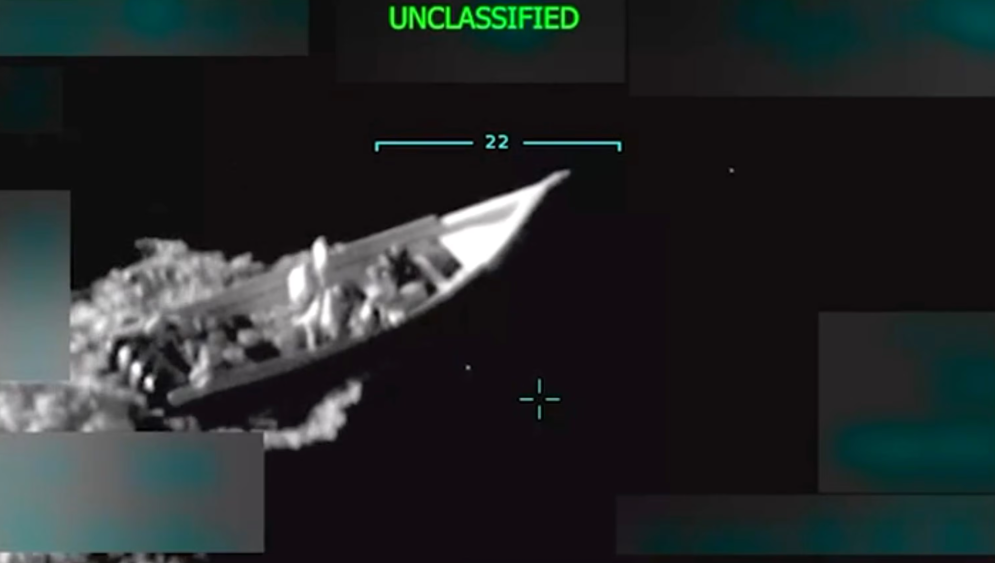The dust has barely settled from a U.S. drone strike ordered by President Trump on a Venezuelan cartel-linked drug vessel, and already the legal commentariat and progressive pundits are sounding the alarm: “Murder,” “war crime,” “assassination.” These are the kinds of hyperbolic terms now being thrown around — not in reference to the 100,000 Americans dying each year from drug overdoses, but in defense of 11 cartel members killed on a narco-boat in international waters.
Let’s start with the facts: On Tuesday, a Predator UAV launched a Hellfire missile at a vessel connected to Tren de Aragua, a violent Venezuelan criminal syndicate increasingly seen as a transnational threat. The result: boat destroyed, 11 dead, and a strong message sent. The response from progressives? Outrage — not at the cartels or their operations, but at Trump for taking action.
1/ I worked at DoD. I literally cannot imagine lawyers coming up with a legal basis for lethal strike of suspected Venezuelan drug boat.
Hard to see how this would not be "murder" or war crime under international law that DoD considers applicable.
Read this expert analysis⤵️ pic.twitter.com/eJ1cmxR7LF
— Ryan Goodman (@rgoodlaw) September 3, 2025
This is where we are now: When President Trump enforces immigration law, it's called "racism." When he cracks down on crime, it's "fascism." And now, when he strikes at international drug traffickers flooding the U.S. with lethal narcotics, it's “murder.”
To be clear, there are legal scholars and former bureaucrats — many of them veterans of Democratic administrations — who are now rushing to argue that this strike violates international law, the Constitution, and norms of civilized engagement. They cite everything from the War Powers Resolution (ignored by every president since Nixon) to the UN Charter (a document frequently invoked but rarely enforced) to Executive Order 12333’s “assassination ban.”
3/ The best line of argument for the administration might be that the law of armed conflict somehow applies.
But if so (and it doesn't), that means the US War Crimes Act applies too, including the prohibition on murder.
Finucane spells out that implication here: pic.twitter.com/KDKDnpTaFr
— Ryan Goodman (@rgoodlaw) September 3, 2025
But let’s not kid ourselves. This isn’t about law. It’s about politics — and more specifically, Trump.
The notion that this drone strike is somehow unprecedented or illegal doesn’t hold up to scrutiny. Presidents from Bush to Obama to Biden have all used targeted military force against non-state actors in foreign territories. The difference? The establishment approved of their “measured” approaches, filled with legal caveats and endless process. Trump’s approach — direct, unapologetic, and executed without fanfare — doesn’t sit well with those still mourning the loss of bureaucratic control over foreign policy.
What’s particularly revealing is the outrage itself. Critics are not objecting to the threat posed by Tren de Aragua, one of the most dangerous criminal networks in the Western Hemisphere. They’re not lamenting the death toll caused by synthetic opioids or the destabilizing effect these groups have on communities across the U.S. No — they’re upset because Trump acted decisively, without their permission, and in a way that might actually work.
5/ These statements by Secretary Rubio make the legal case against the U.S. strike even stronger.
(h/t @John_Hudson reporting) pic.twitter.com/uYP93HcRXx
— Ryan Goodman (@rgoodlaw) September 3, 2025
The legal arguments, when peeled back, are remarkably thin. The UN Charter is invoked, but Tren de Aragua is not a state, and the strike occurred in international waters. The assassination ban is cited, but there's no indication a specific individual was targeted — it was a strike on a hostile, armed entity engaged in drug trafficking. Even the War Powers Act, regularly flouted by every administration, is presented as though it now holds some kind of sacred legal force.
There’s also the quiet part being said out loud: the unease over calling cartels “terrorists.” Once that label is accepted, the legal framework shifts. And critics know it. That’s why they’re desperate to prevent that designation from sticking — because it would give the President broader authority to act militarily, and Trump has shown he's willing to use it.


